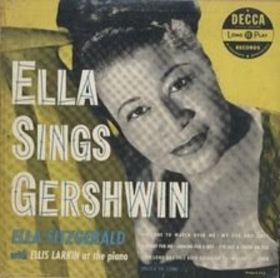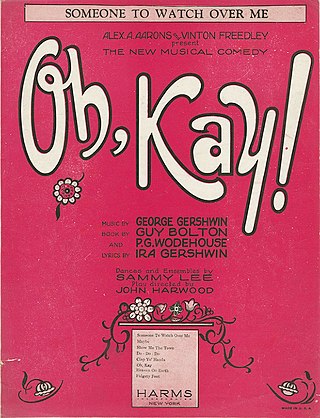Related Research Articles

Girl Crazy is a 1930 musical by George Gershwin with lyrics by Ira Gershwin and book by Guy Bolton and John McGowan. Ethel Merman made her stage debut in the first production and co-lead Ginger Rogers became an overnight star. Rich in song, it follows the story of Danny Churchill who has been sent to fictional Custerville, Arizona, to manage his family's ranch. His father wants him there to focus on matters more serious than alcohol and women but Danny turns the place into a dude ranch, importing showgirls from Broadway and hiring Kate Forthergill as entertainer. Visitors come from both coasts and Danny falls in love with the local postmistress, Molly Gray.
"I Got Rhythm" is a piece composed by George Gershwin with lyrics by Ira Gershwin and published in 1930, which became a jazz standard. Its chord progression, known as the "rhythm changes", is the foundation for many other popular jazz tunes such as Charlie Parker's and Dizzy Gillespie's bebop standard "Anthropology ".

Ella Fitzgerald Sings the George and Ira Gershwin Song Book is a box set by American jazz singer Ella Fitzgerald that contains songs by George and Ira Gershwin with arrangements by Nelson Riddle. It was produced by Norman Granz, Fitzgerald's manager and the founder of Verve Records. Fifty-nine songs were recorded in the span of eight months in 1959. It is one of the eight album releases comprising what is possibly Fitzgerald's greatest musical legacy: Ella Fitzgerald Sings The Complete American Songbook, in which she recorded, with top arrangers and musicians, a comprehensive collection of both well-known and obscure songs from the Great American Songbook canon, written by the likes of Cole Porter, Rodgers & Hart, Irving Berlin, Duke Ellington, George and Ira Gershwin, Harold Arlen, Jerome Kern, and Johnny Mercer.

Ella Sings Gershwin is a 1950 studio album by Ella Fitzgerald, accompanied by the pianist Ellis Larkins. Issued on DL5300 on the Decca label, this was Fitzgerald's first album. Originally on 10" vinyl, which preceded album releases on 12" vinyl, it featured eight tracks.

"Someone to Watch Over Me" is a 1926 song composed by George Gershwin with lyrics by Ira Gershwin, assisted by Howard Dietz who penned the title. It was written for the musical Oh, Kay! (1926), with the part originally sung on Broadway by English actress Gertrude Lawrence while holding a rag doll in a sentimental solo scene. The musical ran for more than 200 performances in New York and then saw equivalent acclaim in London in 1927, all with the song as its centerpiece. Lawrence released the song as a medium-tempo single which rose to #2 on the charts in 1927.
"But Not for Me" is a popular song originally written by George Gershwin and Ira Gershwin for the musical Girl Crazy (1930).
"Embraceable You" is a jazz standard song with music by George Gershwin and lyrics by Ira Gershwin. The song was written in 1928 for an unpublished operetta named East Is West. It was published in 1930 and included in that year's Broadway musical Girl Crazy, performed by Ginger Rogers in a song and dance routine choreographed by Fred Astaire.
"Let's Call the Whole Thing Off" is a song written by George Gershwin and Ira Gershwin for the 1937 film Shall We Dance, where it was introduced by Fred Astaire and Ginger Rogers as part of a celebrated dance duet on roller skates. The sheet music has the tempo marking of "Brightly". The song was ranked No. 34 on AFI's 100 Years...100 Songs.
"'S Wonderful" is a 1927 popular song composed by George Gershwin, with lyrics written by Ira Gershwin. It was introduced in the Broadway musical Funny Face (1927) by Adele Astaire and Allen Kearns.

"Love Is Here to Stay" is a popular song and jazz standard composed by George Gershwin with lyrics by Ira Gershwin for the movie The Goldwyn Follies (1938).
"The Lorelei" is a song composed by George Gershwin, with lyrics by Ira Gershwin; it was written for their musical Pardon My English (1933).
"A Foggy Day" is a popular song composed by George Gershwin, with lyrics by Ira Gershwin. The song was introduced by Fred Astaire in the 1937 film A Damsel in Distress. It was originally titled "A Foggy Day " in reference to the pollution-induced pea soup fogs that were common in London during that period, and is often still referred to by the full title.
The commercial recording by Astaire for Brunswick was very popular in 1937.
"My One and Only" is a song composed by George Gershwin, with lyrics by Ira Gershwin, written for the 1927 musical Funny Face where it was introduced by Fred Astaire, Betty Compton and Gertrude McDonald. It was originally titled "(What Am I Gonna Do) If You Turn Me Down?"
"Boy! What Love Has Done to Me!" is a song composed by George Gershwin, with lyrics by Ira Gershwin. It was introduced by Ethel Merman in the 1930 musical Girl Crazy. In the 1943 film version, the song was performed by Tommy Dorsey and His Orchestra.
"Sam and Delilah" is a song composed by George Gershwin, with lyrics by Ira Gershwin. It was introduced by Ethel Merman in the 1930 musical Girl Crazy. The song is an interpretation of the biblical story of Samson and Delilah in the Book of Judges of the Hebrew Bible.
"Oh, So Nice!" is a song composed by George Gershwin, with lyrics by Ira Gershwin.
"'The Half of it, Dearie' Blues" is a song composed by George Gershwin, with lyrics by Ira Gershwin. It was introduced by Fred Astaire and Kathlene Martyn in the 1924 musical Lady be Good.
"My Cousin in Milwaukee" is a song composed by George Gershwin with lyrics by Ira Gershwin. It was introduced in their 1932 musical Pardon My English. the song, indeed the show, was not a particular hit, although there's a number of vintage recordings of the tune.
"Boy Wanted" is a 1921 song composed by George Gershwin, with lyrics by Ira Gershwin. It was introduced in the musical A Dangerous Maid (1921). Philip Furia in his 1997 book Ira Gershwin: The Art of the Lyricist describes "Boy Wanted" as featuring "by far the most ambitious lyric" in A Dangerous Maid and likens the song to a 'catalog gue song' reminiscent of the work of Gilbert and Sullivan.
"You've Got What Gets Me" is a song composed by George Gershwin, with lyrics by Ira Gershwin, written for the 1932 film Girl Crazy.
References
- ↑ "Girl Crazy". IBDB. Retrieved March 7, 2022.
- ↑ Dick, Bernard F. (2018). That Was Entertainment: The Golden Age of the MGM Musical. University Press of Mississippi. p. 37. ISBN 978-1496817365.
- ↑ Starr, Larry (2010). George Gershwin. Yale University Press. ISBN 978-0300168624.
- ↑ Kimball, Robert (1993). The Complete Lyrics Of Ira Gershwin. Knopf. ISBN 0394556518.
- ↑ Dietz, Dan (2021). The Complete Book of 1910s Broadway Musicals. Rowman & Littlefield Publishers. p. 426. ISBN 9781538150283.